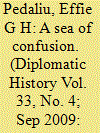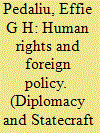|
|
|
Sort Order |
|
|
|
Items / Page
|
|
|
|
|
|
|
| Srl | Item |
| 1 |
ID:
090667


|
|
|
|
|
| Publication |
2009.
|
| Summary/Abstract |
From the beginning of the Cold War, the Mediterranean had emerged as one of the key theaters of confrontation between the United States and the USSR. However, the Cold War was to be just one of the many factors that fed this precarious regional security environment. As British power in the Mediterranean began to contract after 1945, the United States initially reluctantly, but inevitably, moved to fill this power vacuum through the Truman Doctrine, the inclusion into the North Atlantic Treaty Organization (NATO) of initially, France and Italy and later Greece and Turkey and the cultivation of an understanding with General Franco. Attempts were made to create closer relations with moderate Arab regimes through the Eisenhower Doctrine. During the 1950s, the Mediterranean became a sea of American preponderance where, ostensibly, most local sources of discord had been subsumed into the greater global conflict.
|
|
|
|
|
|
|
|
|
|
|
|
|
|
|
|
| 2 |
ID:
102958


|
|
|
|
|
| Publication |
2011.
|
| Summary/Abstract |
This article examines the tensions that arose within transatlantic relations when Greece, a NATO member state, began to violate its citizens' human rights and civil liberties following a military coup in 1967. It considers and analyses NATO's subsequent reluctance to put effective pressure on the Greek regime, despite the fact that all member-states, barring Portugal, were united in their revulsion for it. It looks at how allies ended up at odds on how best to deal with such a dictatorship. It scrutinises the tactics employed by Manlio Brosio and Joseph Luns, Secretaries-General of NATO, to ensure that conflict within the Alliance over the Greek issue was contained and that Cold War priorities retained precedence. Finally, it evaluates the long-term ramifications of the Greek case on transatlantic relations.
|
|
|
|
|
|
|
|
|
|
|
|
|
|
|
|
| 3 |
ID:
076733


|
|
|
|
|
| Publication |
2007.
|
| Summary/Abstract |
The military coup of 21 April 1967 brought to power a repressive dictatorship in Greece. It proceeded to deprive Greeks of their human rights and civil liberties, outraged international public opinion and strained transatlantic relations during the Cold War. The "Greek case" culminated in the withdrawal of Greece from the Council of Europe and calls for its expulsion from NATO. This article will analyse the foreign policy considerations that determined British policy towards the Greek junta during 1967 - such as Cold War realities, alliance dynamics, economic and commercial imperatives, regional instability in the Mediterranean and domestic pressures. It will look at how these factors coalesced into shaping British policy towards the Greek junta into one in which human rights had little bearing. The article will also consider the impact of the "Greek case" on the image and credibility of the Labour government of 1966-1970 and explain why vociferous anti-junta activities in London were to create such policy difficulties for the British government.
|
|
|
|
|
|
|
|
|
|
|
|
|
|
|
|
|
|
|
|
|